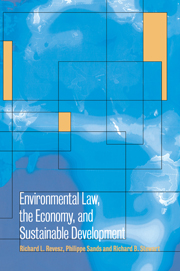 Environmental Law, the Economy and Sustainable Development
Environmental Law, the Economy and Sustainable Development Book contents
- Frontmatter
- Contents
- List of contributors
- Introduction: environmental regulation in multi-jurisdictional regimes
- PART I ENVIRONMENTAL REGULATION IN FEDERAL SYSTEMS
- PART II ENVIRONMENTAL REGULATION AND INTERNATIONAL TRADE
- 4 Environmental protection and the global trade order
- 5 International trade law and international environmental law: environmental taxes and border tax adjustment in WTO law and EC law
- 6 “Environmental protection and the global trade order”: a different perspective
- PART III CHOICE OF ENVIRONMENTAL POLICY INSTRUMENTS
- PART IV THE ENVIRONMENTAL STANDARD - SETTING PROCESS
- PART V INTERNATIONAL ENVIRONMENTAL LAW AND SUSTAINABLE DEVELOPMENT
- Index
6 - “Environmental protection and the global trade order”: a different perspective
Published online by Cambridge University Press: 03 May 2010
- Frontmatter
- Contents
- List of contributors
- Introduction: environmental regulation in multi-jurisdictional regimes
- PART I ENVIRONMENTAL REGULATION IN FEDERAL SYSTEMS
- PART II ENVIRONMENTAL REGULATION AND INTERNATIONAL TRADE
- 4 Environmental protection and the global trade order
- 5 International trade law and international environmental law: environmental taxes and border tax adjustment in WTO law and EC law
- 6 “Environmental protection and the global trade order”: a different perspective
- PART III CHOICE OF ENVIRONMENTAL POLICY INSTRUMENTS
- PART IV THE ENVIRONMENTAL STANDARD - SETTING PROCESS
- PART V INTERNATIONAL ENVIRONMENTAL LAW AND SUSTAINABLE DEVELOPMENT
- Index
Summary
Introduction
This chapter addresses the first three of the four issues analyzed by Professor Roessler: exempting domestic environmental policies from WTO obligations, permitting WTO Members to offset differences in environmental regulations, and reforming the WTO to allow the use of sanctions to coerce WTO Members into raising their environmental standards. On the fourth issue discussed by Professor Roessler – that the WTO should open its decisionmaking to scrutiny by environmental organizations – I have nothing to add to what he and others have already said.
Exempting domestic environmental policies from WTO obligations
Should domestic environmental policy be generally exempt from having to comply with the multilateral trading rules? The argument in favor of this proposal seems to be that the exemption would increase the demand for environmental policies by politicians, and that this would be good for the environment, even if it were not good for trade. In fact, the exemption would potentially be disastrous for trade, as it amounts to a giant loophole in the trading regime. And there can be no presumption that the environment would be any better protected, either. The point is that, under this regime, environmental policy would serve the cause of protectionism. Environmental policy would be devised not only or perhaps even mainly to protect the environment but to protect domestic industry (at the expense, perhaps, of foreign industry). There can be no presumption that policies which protect markets would necessarily protect the environment.
Up to here, Professor Roessler and I are in agreement.
- Type
- Chapter
- Information
- Environmental Law, the Economy and Sustainable DevelopmentThe United States, the European Union and the International Community, pp. 156 - 168Publisher: Cambridge University PressPrint publication year: 2000


